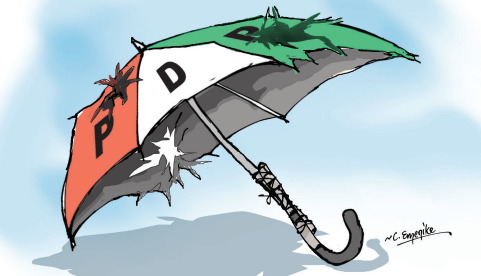THE Peoples Democratic Party (PDP) is once again engulfed in internal strife, with fresh divisions deepening between rival blocs in the South ahead of the party’s much-anticipated convention in Ibadan.
News Point Nigeria reports that the latest storm follows a controversial gathering in Lagos, which some southern leaders denounced as “illegal, exclusionary, and unrepresentative.”
The meeting, reportedly dominated by allies of Oyo State Governor, Seyi Makinde, has widened tensions between his camp and that of Federal Capital Territory (FCT) Minister, Nyesom Wike.
At stake is not only the zoning of key party positions ahead of the Ibadan convention, but also the PDP’s broader cohesion as it seeks to reposition itself for the 2027 general elections.
National Vice Chairman of the PDP (South-West), Kamorudeen Ajisafe, rejected claims of exclusion, insisting the Lagos meeting was “widely representative.”
“The gathering was attended by two sitting governors from the South-West, 17 representatives from across the country, the chairman of the party’s Board of Trustees, Senator Adolphus Wabara from the South-East, as well as Governor Peter Mba of Enugu. It was not divisive or exclusionary,” Ajisafe said.
He explained that the Lagos meeting was consultative and designed to fine-tune preparations for the Ibadan convention, cautioning against “dragging the PDP into another round of crisis.”
Ajisafe maintained: “If stakeholders in Abuja could issue statements, then they too are consulting, just as we did in Lagos. My appeal is for harmonisation, not hostility.”
But leaders from the South-East and South-South issued a blistering joint statement, disowning the Lagos meeting and warning against attempts to hijack decision-making structures.
The signatories included state party chairmen Austin Nwachukwu (Imo), Abraham Amah (Abia), Venatius Ikem (Cross River), Aniekan Akpan (Akwa Ibom), Aaron Chukwuemeka (Rivers), as well as PDP National Vice Chairman (South-East), Chidiebere Egwu Goodluck, and Minority Leader of the House of Representatives, O.K. Chinda.
They argued that the Lagos gathering deliberately sidelined state chairmen, serving governors, principal National Assembly officers, and critical stakeholders.
“It is highly regrettable that such a meeting was convened without courtesy to key state chairmen and national officers. This brazen disregard undermines collective decision-making and risks weakening the foundation of our party,” the statement read.
They further stressed that the Lagos resolutions “cannot and shall not assume the authority of consensus,” warning that they would resist any attempt to manipulate zoning arrangements through “clandestine manoeuvres.”
Amid the row, Governor Makinde, speaking at a separate PDP Southern Zoning Consultative Summit, emphasised that strengthening party structures must take precedence over presidential zoning.
“We need a functioning political party first before discussing candidates. If we don’t have a party, anything else will collapse. Our focus now is building a strong, united PDP that Nigerians can trust,” Makinde said.
He was joined by Governor Duoye Diri of Bayelsa, Deputy Governor Ifeanyi Ossai representing Enugu’s Peter Mba, and elder statesmen such as former Senate President Adolphus Wabara, former National Deputy Chairman Bode George, and ex-governors Udom Emmanuel and Sam Egwu.
Makinde dismissed claims that the PDP was in disarray, insisting the calibre of leaders at the Lagos consultations proved the party was still alive.
Meanwhile, FCT Minister Nyesom Wike has continued to signal his alignment with the ruling APC, declaring in Abuja that he would support any leader who backs President Bola Tinubu.
Speaking at the flag-off of water supply projects in Karu, Wike said: “Anybody who supports Tinubu, I will support him. Agreement is agreement. The people of Karu will remember the government that remembered them.”
Wike’s remarks, analysts say, further underline the widening gulf between his camp and PDP loyalists attempting to preserve the party’s identity.
With duelling summits in Lagos and Abuja, and camps rallying around Makinde and Wike respectively, the PDP risks entering its Ibadan convention more divided than united.
While Ajisafe and his allies insist the Lagos consultations were legitimate, southern critics maintain no final decision particularly on zoning can stand without NEC’s ratification.
The battle for control of the PDP, and its 2027 strategy, now pivots on whether party leaders can reconcile these deepening rifts or whether parallel camps will drag the opposition into another prolonged crisis.







